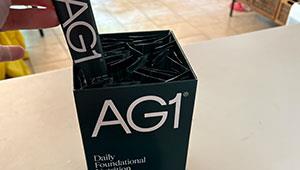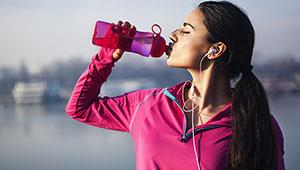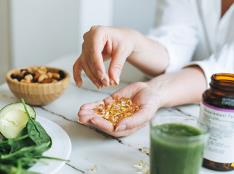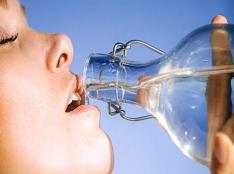
Athletes who want to build muscles and recover well from workouts are often confused by ads for protein supplements. How much and what kinds of protein should athletes consume? And can egg whites and chicken can do the job? The following information can help you optimize your protein intake--and offer peace of mind.
Question: "I want to bulk up. I've started drinking three protein shakes per day between meals. Is this enough or too much?
Answer: To determine how many protein shakes you need, you should first determine how much protein your body actually can use. You need adequate protein to enhance muscle growth; excess protein is not better.
Most exercise scientists agree that one gram of protein per pound of body weight is a very generous protein allowance for athletes building muscle mass. (More likely, 0.5 to 0.75 grams of protein per pound will do the job if you are eating plenty of calories--but let's be generous.) This means a novice 180-pound body builder gets more than enough protein with 180 grams of protein per day. He can easily consume that much with one quart of skim milk, two cans of tuna (i.e., two sandwiches at lunch) and one large (eight-ounce) chicken breast at dinner. Consuming protein shakes on top of this simply adds (expensive) calories. You could more wisely get the calories from carbs to fuel your workouts.
Question: Is the protein in designer shakes more effective than egg whites, tuna, chicken and other standard foods?
Answer: With names like Protein Revolution and N-Large, the commercial protein products can leave you wondering if standard foods are an equal match. Plus, ads that rave "extremely bioavailable," "no cheap protein blends," and "highest quality protein" also leave the impression that tuna or milk don't quite make the grade. Doubtful.
The protein from natural foods works perfectly fine. Any animal protein is "high-quality" and contains all the essential amino acids you need to build muscles. Hence, eating balanced meals and then drinking protein shakes for "high-quality protein" is an outrageous concept--and expensive. For the $32 you spend on a box with 12 packets, you can buy lots of powdered milk--the least expensive protein power around. And you'll get not only high-quality protein, but also a whole package of balanced nutrition--perfectly designed by Nature.
In an overall well-balanced diet, engineered protein offers no advantages over chicken, beef, fish, eggs, milk and other standard protein-rich foods. As long as you are healthy and have a functioning digestive tract (as opposed to patients in the hospital with intestinal disease), you need not worry about your ability to digest or utilize protein. Digestibility and bioavailability are an issue in third-world countries where protein and calorie intakes are inadequate and every amino acid counts.
Question: Should I refuel with a protein shake after my workout?
Answer: No. You should refuel with a carb shake that has a little protein. As an athlete, your body needs a foundation of carbohydrates at each meal to fuel your muscles. While some protein is important to build and repair muscles, consuming too much protein displaces carbs. I counsel too many carb-deficient athletes who hurt their ability to train hard and get the most from their workouts because they choose a protein-based diet lacking in fruit, veggies and grains.
You should target three to five grams of carbohydrate per pound of body weight. If you weigh 150 lbs, that's 150 to 200 grams carb per meal. If you chug a can of Ready-To-Drink Meal Replacement Shake with 40 grams of protein (at cost of about $3.60), you’ll get only 12 grams of carbs. A fruit smoothie (juice, yogurt, banana, berries) or chocolate milk would be better bets that offer more carbs and enough protein. If you prefer the protein shake, be sure to bolster your carb intake with a banana and a whole grain bagel as well.
Natural proteins offer all the amino acids touted by commercial products. Here’s how two amino acids stack up:
| Protein source | Serving Size | Isoleucine (grams) | Leucine (grams) |
| Met-Rx Whey Protein | 1 scoop | 1.4 | 2.3 grams |
| Chocolate milk | 16 oz | 1.2 | 1.9 |
| Tuna | 6 oz can | 2.0 | 3.5 |
| Cottage cheese | 1 cup | 1.6 | 2.9 |
In general, engineered foods lack fiber, phytochemicals and other health-protective nutrients. No engineered food can match the complex balance of nutrients designed by Nature. Sure you can grab a meal-in-a-can for "emergency food" on hectic days, but trust that real food is best in the long run.
Question: How much protein should I eat right after I exercise?
Answer: A study with Marines during 54 days of basic training reports those who refueled with 100 calories of a recovery drink that contained only 10 grams (40 calories) of protein not only enhanced muscle protein deposition but also contributed to 33 percent fewer total medical visits, 28 percent fewer visits due to bacterial and viral infections, 37 percent fewer visits due to muscle and joint problems, and 83 percent fewer visits due to heat exhaustion. (Flakoll, Med Sci Sports and Exercise, 2004)
Seems amazing that just 100 calories of a recovery drink could make such a strong impact on health, muscle soreness and hydration, but the message is clear: proper fueling at the right times is worth the effort. Don't underestimate the value of refueling soon after you exercise. Cereal with milk, chocolate milk, fruit yogurt, turkey sandwich and spaghetti with meatballs are just a few suggestions that offer a foundation of carbs accompanied with some protein.









Discuss This Article